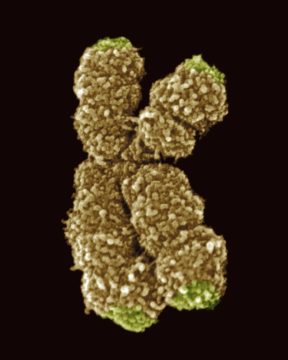Gina Kolata in The New York Times:
 The story, as often happens in science, sounded so appealing. Cells have a molecular clock that determines how long they live. If you can just stop the clock, cells can live indefinitely. And the same should go for people, who are, after all, made from cells. Stop the cell clocks and you can remain youthful.
The story, as often happens in science, sounded so appealing. Cells have a molecular clock that determines how long they live. If you can just stop the clock, cells can live indefinitely. And the same should go for people, who are, after all, made from cells. Stop the cell clocks and you can remain youthful.
The clocks come in the form of caps on the end of chromosomes — the long twisted strings of DNA carrying the cells’ genes. The caps on chromosomes, called telomeres, are chains of short, repeated segments of DNA. Every time a cell divides, its telomeres get a little shorter, until finally they get so short that the cell dies. “Short telomeres were thought to be bad — people with premature aging syndromes had short telomeres — so, by analogy, long telomeres were thought to be good,” said Dr. Mary Armanios, professor of oncology at Johns Hopkins University School of Medicine and director of the Telomere Center at the medical school’s Sidney Kimmel Comprehensive Cancer Center. “And the longer the better.”
But, of course, nothing in biology is so simple. And a paper published Thursday in the New England Journal of Medicine, with results of a study that Dr. Armanios led, shows that the telomere story is no exception. While short telomeres do lead to health problems, long telomeres lead to health problems of their own. Far from extending life, long telomeres appear to cause cancer and a blood disorder known as CHIP, a condition that increases the risk of blood cancers and heart disease.
More here.
